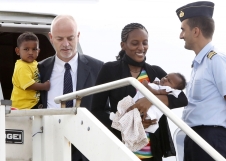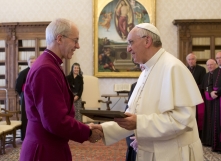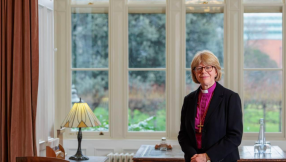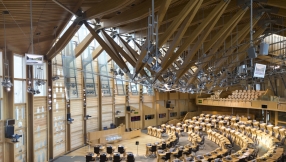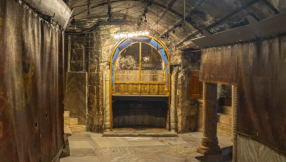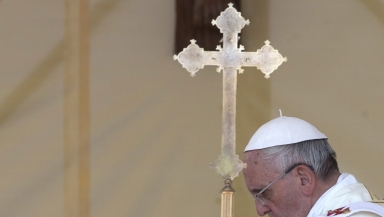
The Pope has issued a ringing condemnation of churches that adopt models of management drawn from the world of business and pastors who succumb to the temptations of worldly success and power.
Preaching to bishops in South Korea, he said that for all its material prosperity, the world is seeking something greater, more authentic and fulfilling.
"Solidarity with the poor has to be seen as an essential element of the Christian life," he said. "A prophetic witness to the Gospel presents particular challenges to the Church in Korea, since she carries out her life and ministry amid a prosperous, yet increasingly secularised and materialistic society.
"In such circumstances it is tempting for pastoral ministers to adopt not only effective models of management, planning and organisation drawn from the business world, but also a lifestyle and mentality guided more by worldly criteria of success, and indeed power, than by the criteria which Jesus sets out in the Gospel.
"Woe to us if the cross is emptied of its power to judge the wisdom of this world! I urge you and your brother priests to reject this temptation in all its forms. May we be saved from that spiritual and pastoral worldliness which stifles the Spirit, replaces conversion by complacency, and, in the process, dissipates all missionary fervor."
Pope Francis told the bishops at the Korean Episcopal conference in Seoul, headed by Bishop Peter U-il Kang, that it was a "blessing" for him to be in South Korea for me to be here and to witness at first hand the life of the Church.
He called on them to be guardians of memory and of hope.
"The fruitfulness of the Gospel on Korean soil, and the great legacy handed down from your forefathers in the faith, can be seen today in the flowering of active parishes and ecclesial movements, in solid programs of catechesis and outreach to young people, and in the Catholic schools, seminaries and universities," he said.
From being a land of mission, Korea had become a land of missionaries, he said in the speech, posted on the Zenit news website in Rome.
"Our memory of the martyrs and past generations of Christians must be one that is realistic, not idealized or triumphalistic. Looking to the past without hearing God's call to conversion in the present will not help us move forward. Instead, it will only hold us back and even halt our spiritual progress."
The Pope sent an unprecedented message of good will to China on Thursday before touching down in Seoul, although the first papal trip to Asia in 15 years got off to a shaky start with the news some Chinese had been barred from joining a youth celebration.
Reuters reports that about half of more than 100 Chinese who had planned to attend an Asian Youth Day event during the visit are unable to do so because of "a complicated situation inside China," according to Heo Young-yeop, spokesman for the Committee for the Papal Visit to Korea.
He declined to give further details, citing their safety. Another organiser said some of the would-be attendees had been arrested by Chinese authorities.
Beijing rejects Vatican authority over its Catholics.
As the pope's plane approached South Korean airspace off the west of the peninsula, North Korea test fired three short-range rockets into the sea off its east coast, according to South Korea's defense ministry.
The test site was hundreds of kilometers away from the Pope's plane. North Korea fired two more projectiles from the same location early on Thursday afternoon.
The North has tested an unprecedented number of rockets and missiles this year and has in recent weeks said the launches were in retaliation to US-South Korean military exercises scheduled to start on Monday.
Pyongyang often stages such tests when rival South Korea is in the global spotlight, in what is seen as a means to grab a share of the attention.
The Pope will spend five days in South Korea, meeting some of the country's five million Catholics on the first trip by a pontiff to Asia since 1999, but much of the attention will be on the Vatican's relations with China.
"Upon entering Chinese air space, I extend best wishes to your Excellency and your fellow citizens and I invoke the divine blessing of peace and well-being upon the nation," he said in a radio message to President Xi Jinping.
The Vatican has had no formal relations with China since shortly after the Communist Party took power in 1949. The Catholic Church in China is divided into two communities: an "official" Church known as the "Patriotic Association" answerable to the Party, and an underground Church that swears allegiance only to the pope in Rome.










